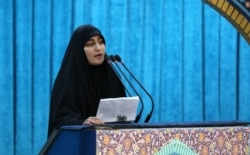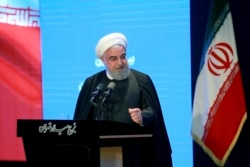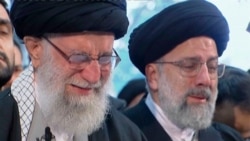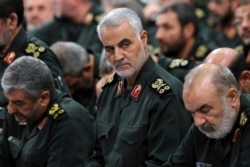Hundreds of thousands of Iranians took to the streets of Tehran on Monday to mourn top general Qassem Soleimani at his funeral, even as Iranian officials vowed to exact revenge against the U.S. for the drone attack that killed him.
Iran's supreme leader, Ayatollah Ali Khamenei, wept as he prayed over Soleimani's flag-draped coffin and those of five other "martyrs" killed in the U.S. strike outside the Baghdad airport late last week, an attack ordered by U.S. President Donald Trump.
Black-clad Iranians carried anti-American signs and portraits of the 62-year-old Soleimani, who was the commander of the Revolutionary Guards' Quds Force. As they marched, the mourners chanted "Death to America" and "Death to Israel."
Soleimani's daughter, Zeinab, in an emotional speech, called Trump a "symbol of stupidity and a toy in the hand of Zionism, don't think that with the martyrdom of my father everything is over."
U.S. officials have blamed Soleimani for the killings of American troops in Iraq by Iranian-backed forces and accused him plotting "imminent” new attacks against U.S. personnel in the region, while not publicly disclosing the nature of the threat.
The war of words between Trump and Iranian officials was unabated. Trump vowed in an all-caps Twitter comment, "IRAN WILL NEVER HAVE A NUCLEAR WEAPON!" after Tehran's Sunday announcement that it was further curbing its compliance with the 2015 international pact restraining its nuclear program — a deal from which Trump withdrew the U.S.
Threats and counter-threats
With Iran's threats to seek revenge for Soleimani's killing, Trump vowed late Sunday that the U.S. will strike "very hard and very fast" at as many as 52 Iranian targets if the Islamic republic attacks U.S. personnel or assets — the number 52 representing the number of Americans Tehran took hostage in 1979 for 444 days.
"They're allowed to kill our people," Trump told reporters aboard Air Force One. "They're allowed to torture and maim our people. They're allowed to use roadside bombs and blow up our people and we're not allowed to touch their cultural sites? It doesn't work that way."
Iranian President Hassan Rouhani rebuffed Trump's threat, saying, "Those who refer to the number 52 should also remember the number 290. #IR655. Never threaten the Iranian nation." It was a reference to the U.S. mistakenly shooting down an Iranian passenger jet flying over the Persian Gulf in 1988, killing all 290 people aboard the aircraft. Then U.S. President Ronald Reagan expressed deep regret over the incident and the U.S. paid nearly $62 million in reparations to the victims' families.
As the threats and counter-threats ricocheted between Tehran and Washington, NATO chief Jens Stoltenberg urged Iran to avoid "further violence and provocations." At an emergency session of NATO's ruling council in Brussels, U.S. officials briefed allies about the drone strike that killed Soleimani.
Stoltenberg said it was a "U.S. decision" to launch the attack, but added that the other 28 NATO countries had longstanding concerns about aggressive Iranian military actions in the Middle East.
In another development, U.S. Secretary of State Mike Pompeo met Saudi Deputy Defense Minister Khalid bin Salman Al Saud in Washington. The State Department said Pompeo thanked Al Saud for Riyadh's "continued support" and for "working with the U.S. to counter the threat posed by the Iranian regime."
Speaking to VOA Persian, London-based Iranian dissident and political analyst Alireza Nourizadeh said the demise of Soleimani is welcome news to several of Iran's neighbors.
"Saudi Arabia, Kuwait, Bahrain and Lebanon — they were targets of Soleimani and endured his attacks," Nourizadeh said.
In another VOA Persian interview, former U.S. ambassador to the UAE Barbara Leaf said majority-Sunni Gulf nations Saudi Arabia and the UAE, who long have accused predominantly-Shi'ite Iran of seeking regional hegemony, both have been "muted" in their public responses to the U.S. killing of Soleimani.
"The theme of their comments essentially is, it is time for de-escalation and a political approach to resolving these issues," said Leaf, an analyst at the Washington Institute for Near East Policy. "It is safe to say that all Gulf countries as well as Iraqis are extremely anxious about the prospect of an escalation to actual clashes between the U.S. and Iran."
Senate briefing
The White House said it will brief the entire 100-member Senate about the drone attack on Wednesday. While Republicans have generally supported Trump's action to take out Soleimani, opposition Democrats have called for publication of U.S. intelligence used by his aides to justify the strike.
House Speaker Nancy Pelosi said in a Sunday letter to her Democratic colleagues that the House will vote this week on a war powers resolution "to limit the President's military actions regarding Iran."
"It reasserts Congress's long-established oversight responsibilities by mandating that if no further Congressional action is taken, the Administration's military hostilities with regard to Iran cease within 30 days," Pelosi wrote.
She called last week's airstrike "provocative and disproportionate," and said it endangered U.S. troops while escalating tensions with Iran.
Senator Lindsey Graham, one of Trump's Republican allies, said the president "did the right thing" and that his national security team is "doing a great job helping President Trump navigate Iranian provocations."
Trump tweeted Sunday that his social media posts "will serve as notification to the United States Congress that should Iran strike any U.S. person or target, the United States will quickly & fully strike back, & perhaps in a disproportionate manner. Such legal notice is not required, but is given nevertheless!"
Yale University law professor Oona Hathaway told VOA the president is required by U.S. law to formally notify Congress of his intent to go to war and cannot do so only by tweet.
"Any time the president involves the armed forces into hostilities, he must — at a minimum — notify Congress within 48 hours," she said.
The White House sent a classified notification to Congress late Saturday under the War Powers Act about Friday's U.S. strike on Soleimani, doing so within the required time frame, but also prompting complaints from Democrats who said the strike's justification memo should be declassified in full.
Hathaway also said a "disproportionate" response would break international law that calls for self-defensive actions taken by nations to be proportionate to the threat.
Pompeo said Sunday that every target struck by U.S. forces would be a "lawful" one.
VOA Persian's Katherine Ahn and Afshar Sigarchi contributed to this report.










